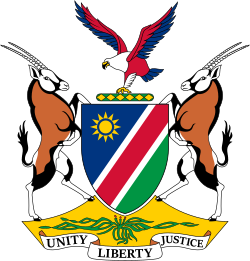 |
|---|
The chief justice of Namibia is the head of the Supreme Court of Namibia, the highest appellate court in Namibia. It is the highest post in the Namibian judicial system, presiding over the operation of the supreme court. The position was created on 21 March 1990, the day of Namibian independence, along with the foundation of the Supreme Court. [1]
Contents
The chief justice is responsible for the swearing-in of members of the National Assembly [2] as well as the president of Namibia, and further for the safekeeping of the presidential symbols of the power (constitution, seal of state, and national flag) during the handover from one president to another. [3] They can further request the Namibian president to appoint Acting Judges, either to fill temporary vacancies, or to supplement the jury ad hoc with experts on certain legal issues. [4]
The Chief Justice and all other judges are appointed by the President of Namibia on the recommendation of the Judicial Service Commission in which the Chief Justice is a member. Other members of this commission are the Attorney-General of Namibia, a judge appointed by the President, and two representatives of the legal fraternity. [4]